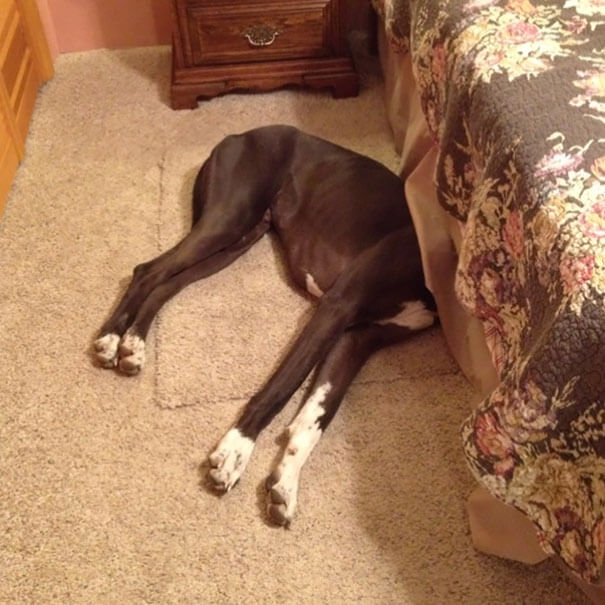Dogs display all kinds of symptoms on their deathbeds.
These include a disinterest in food, water, and play, incontinence, vomiting, diarrhea, lethargy, and weight loss among other signs.
While not all dogs hide when death is approaching, many of them unfortunately do.
Rather than spending their days in their usual sleeping spots, most canines would crawl under the bed or at the back of the closet never to come out.
Others leave the home altogether for a hideout in the neighbor’s bush where they’ll dig a hole in the ground and lie in it until death comes.
As an already grieving pet parent, seeing your doggie hide from you when they are going through the most painful time of their life is devastating.
All you want to do is throw your loving arms around the doggie and let them know you are there for them.
But when they hide, they deprive you of this.
It can be confusing to know what triggered the behavior in the first place.
In this post, we discuss some of the reasons a dog hides when they are dying.
1. For Protection
The number one reason dogs hide from their owners when they are dying is to protect themselves.
In the wild, a pack member would separate from the pack when they were sick, injured, or dying.
Instinctually, they would know when their bodies had gotten weaker rendering them vulnerable to attacks from predators.
Since there is nothing else to do to protect themselves, these pups would find a spot that was hidden away to rest, recharge, or simply die.
Our dogs, albeit being domesticated, still possess these characteristics.
When the body deteriorates and the dog knows that her line of defense has been affected, they would retreat to an area far from everyone to die or recover.
Pets love hiding under beds, behind a stack of boxes, at the back of closets, or in a nearby bush.
2. Out of Discomfort
While a majority of dogs hide when they are dying for protection, others do it to get a comfortable spot to rest their heads.
When the pooch is dying, comfort is everything.
His energy levels are so low and moving around can prove a challenge.
As death comes close, the dog may not be able to switch sides at all.
Lying in a cozy place can make the burden a little lighter for the poor thing.
Some animals prefer a darker and quieter place to spend their final days.
If your pet ditches his usual quarters for a hidden spot somewhere, chances are that he’s simply looking for a cozier or more comfortable place to rest.

3. Cognitive Dysfunction Syndrome
Canine cognitive dysfunction or CCD is an illness that mostly affects older dogs and causes things like disorientation, sleep-wake cycle disturbance, and altered interactions with other pets and their owners.
The condition can be equated to Alzheimer’s or dementia in human beings.
It triggers deficits in memory and learning, minimal responsiveness to stimuli, and changes in awareness.
Some of the common symptoms of CCD include failure to recognize familiar people or pets and night walking.
Dogs that are sick and have CCD may wander away from home because of the changes in their behavior.
There are those that just wake up and leave the homes they have known for years because they can no longer recognize anyone.
Others go to some place and while there, they cannot find their way back.
They may keep wandering or simply stay in one place until they breathe their last.
4. Out of Fear
One of the reasons canines leave their homes is out of some kind of fear.
Dying is an anxious and frightening process for any dog.
It is possible for your furry friend to hide when dying just because the experience is overwhelming to him.
Being all by himself in a quiet and hidden spot somehow makes dying a little more bearable than having people or pets around.
Can A Dog Sense It’s Going To Die?

Even after being our friends for millennia, there’s still a lot that we as humans still don’t understand about our dogs.
A good example is what goes on in their tiny brains.
However, with all the signs that dying dogs throw at their pet owners, it is impossible to wonder if they know when their time on earth is coming to an end.
You will often come across reports of dog parents claiming that their dogs had a clue that they were about to cross over to the Rainbow Bridge.
A perfect example is what we have discussed above—dogs hiding when they sense death approaching.
There’s no doubt that animals understand death to a certain extent.
In the wild, elephants grieve for their departed souls for a long time.
Whales stay with their dead babies and won’t leave them even after their death.
Our canine companions also display some level of intelligence when death comes to a pack member.
Some pet owners claim that when one of their dogs was dying, other dogs in the family never left their side.
But, the real question is: “does a dog know it’s about to die?”
According to PetMD, it is virtually difficult to know if a dog can sense their death or not.
There are glaring physical pieces of evidence of dogs doing things that may show they are aware of their impending death.
Nevertheless, it is difficult to answer the question in the affirmative.
What is important is that owners know when their pets are about to die so they can do something about it.
Psychology Today echoes the above sentiments to a greater extent.
Granted, there’s a possibility that dogs can feel when they are about to die but science hasn’t proven it yet.
It is impossible to ask any pup what they are thinking at any point in time and why they did what they did.
We can only remain open to the likelihood that dogs can indeed feel when they are wasting away.
What to Do If You Feel Your Dog Is Hiding Because He’s Dying

As your furry friend nears the point of death and hides away, it is natural to feel confused about what to do.
As a loving pet owner, you want to offer all the comfort and support you think your friend needs.
The problem is that, unlike humans, dogs don’t particularly prefer company on their last days on earth.
Well, a majority of them would rather deteriorate on their own.
This is where you have to read your dog’s cues.
Some pups, despite hiding away don’t mind having their owners around for support and affection.
If yours is one of them, spend as much time as you can with her until she passes on.
Speak words of comfort and kindness as you stroke the pup’s fur (if she’ll allow it) to let her know you understand her pain.
Else, if your doggie doesn’t want any form of company, try to stay away however hurtful that is to you.
You can watch from a distance the situation your pup is in.
Another thing you can do is to look for the dog’s hiding spot and make it as warm and comfortable as can be.
Get her enough bedding and towels.
Find time to change the towels and clean the dog by wiping her, especially the nether regions.
If the doggie is willing to eat something, get a palatable protein for them like plain chicken meat.
Don’t be hopeful, though.
Most dogs, at the point of death, have no hunger sensation as their organs are shutting down.
You may also want to check: How Long Does It Take For a Dog To Die Naturally?
Closing Thoughts
Dogs hide when they are dying for several reasons including to protect themselves, out of fear and discomfort, and due to dog dementia.
Watching your pet in pain is one of the hardest things you will have to experience.
Yet, some dogs would rather suffer alone than embrace support and affection from their loved ones.
Understand your doggie and give her what she wants on her deathbed.
Here are more related posts you may want to check:
How to Tell How Long a Dog Has Been Dead
What to Do If Dog Dies At Home at Night
My Dog Died—What Should I Do With the Body?
As an Amazon Associate, we may receive a small commission from qualifying purchases but at no extra cost to you. Learn more. Amazon and the Amazon logo are trademarks of Amazon.com, Inc, or its affiliates.

